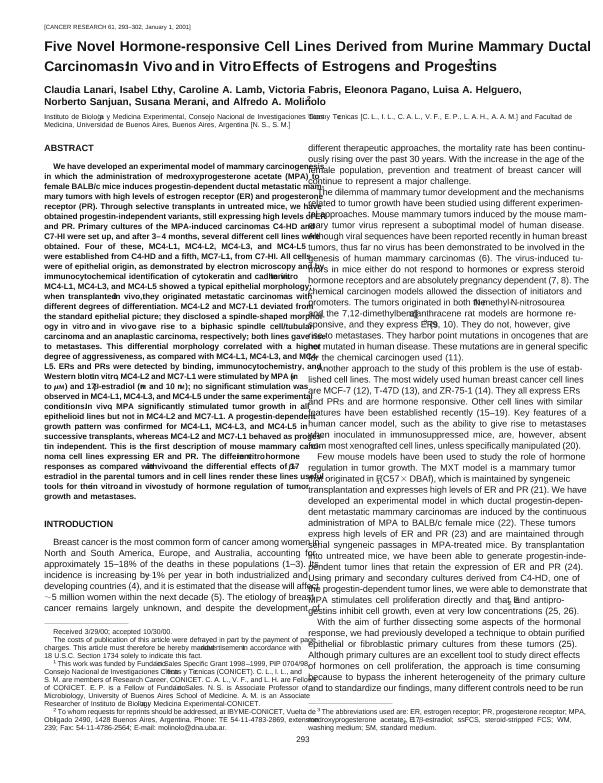Artículo
Five novel hormone-responsive cell lines derived from murine mammary ductal carcinomas: in vivo and in vitro effects of estrogens and progestins.
Lanari, Claudia Lee Malvina ; Luthy, Isabel Alicia
; Luthy, Isabel Alicia ; Lamb, Caroline Ana
; Lamb, Caroline Ana ; Fabris, Victoria Teresa
; Fabris, Victoria Teresa ; Pagano, Eleonora Samanta
; Pagano, Eleonora Samanta ; Helguero, Luisa A.; Sanjuan, Norberto Aníbal
; Helguero, Luisa A.; Sanjuan, Norberto Aníbal ; Merani, Susana; Molinolo, Alfredo
; Merani, Susana; Molinolo, Alfredo
 ; Luthy, Isabel Alicia
; Luthy, Isabel Alicia ; Lamb, Caroline Ana
; Lamb, Caroline Ana ; Fabris, Victoria Teresa
; Fabris, Victoria Teresa ; Pagano, Eleonora Samanta
; Pagano, Eleonora Samanta ; Helguero, Luisa A.; Sanjuan, Norberto Aníbal
; Helguero, Luisa A.; Sanjuan, Norberto Aníbal ; Merani, Susana; Molinolo, Alfredo
; Merani, Susana; Molinolo, Alfredo
Fecha de publicación:
12/2001
Editorial:
American Association for Cancer Research
Revista:
Cancer Research
ISSN:
0008-5472
Idioma:
Inglés
Tipo de recurso:
Artículo publicado
Clasificación temática:
Resumen
We have developed an experimental model of mammary carcinogenesis in which the administration of medroxyprogesterone acetate (MPA) to female BALB/c mice induces progestin-dependent ductal metastatic mammary tumors with high levels of estrogen receptor (ER) and progesterone receptor (PR). Through selective transplants in untreated mice, we have obtained progestin-independent variants, still expressing high levels of ER and PR. Primary cultures of the MPA-induced carcinomas C4-HD and C7-HI were set up, and after 3–4 months, several different cell lines were obtained. Four of these, MC4-L1, MC4-L2, MC4-L3, and MC4-L5 were established from C4-HD and a fifth, MC7-L1, from C7-HI. All cells were of epithelial origin, as demonstrated by electron microscopy and by immunocytochemical identification of cytokeratin and cadherin. In vitro MC4-L1, MC4-L3, and MC4-L5 showed a typical epithelial morphology; when transplanted in vivo, they originated metastatic carcinomas with different degrees of differentiation. MC4-L2 and MC7-L1 deviated from the standard epithelial picture; they disclosed a spindle-shaped morphology in vitro and in vivo gave rise to a biphasic spindle cell/tubular carcinoma and an anaplastic carcinoma, respectively; both lines gave rise to metastases. This differential morphology correlated with a higher degree of aggressiveness, as compared with MC4-L1, MC4-L3, and MC4-L5. ERs and PRs were detected by binding, immunocytochemistry, and Western blot. In vitro, MC4-L2 and MC7-L1 were stimulated by MPA (nM to uM) and 17beta-estradiol (nM and 10 nM); no significant stimulation was observed in MC4-L1, MC4-L3, and MC4-L5 under the same experimental conditions. In vivo, MPA significantly stimulated tumor growth in all epithelioid lines but not in MC4-L2 and MC7-L1. A progestin-dependent growth pattern was confirmed for MC4-L1, MC4-L3, and MC4-L5 in successive transplants, whereas MC4-L2 and MC7-L1 behaved as progestin independent. This is the first description of mouse mammary carcinoma cell lines expressing ER and PR. The different in vitro hormone responses as compared with in vivo and the differential effects of 17beta-estradiol in the parental tumors and in cell lines render these lines useful tools for the in vitro and in vivo study of hormone regulation of tumor growth and metastases.
Palabras clave:
Breast Cancer
,
Carcinoma
,
Mice
,
Hormones
Archivos asociados
Licencia
Identificadores
Colecciones
Articulos(IBYME)
Articulos de INST.DE BIOLOGIA Y MEDICINA EXPERIMENTAL (I)
Articulos de INST.DE BIOLOGIA Y MEDICINA EXPERIMENTAL (I)
Citación
Lanari, Claudia Lee Malvina; Luthy, Isabel Alicia; Lamb, Caroline Ana; Fabris, Victoria Teresa; Pagano, Eleonora Samanta; et al.; Five novel hormone-responsive cell lines derived from murine mammary ductal carcinomas: in vivo and in vitro effects of estrogens and progestins.; American Association for Cancer Research; Cancer Research; 61; 1; 12-2001; 293-302
Compartir



